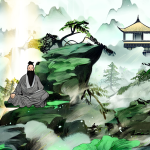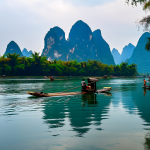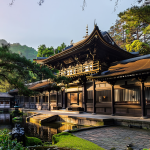郑伯克段于鄢

《郑伯克段于鄢》原文
初,郑武公娶于申,曰武姜。生庄公及共叔段。庄公寤生,惊姜氏,故名曰“寤生”,遂恶之。爱共叔段,欲立之,亟请于武公,公弗许。
及庄公即位,为之请制。公曰:“制,岩邑也,虢叔死焉,佗邑唯命。”请京,使居之,谓之“京城大叔”。
祭仲曰:“都,城过百雉,国之害也。先王之制:大都,不过参国之一;中,五之一;小,九之一。今京不度,非制也,君将不堪。”公曰:“姜氏欲之,焉辟害?”对曰:“姜氏何厌之有?不如早为之所,无使滋蔓。蔓,难图也。蔓草犹不可除,况君之宠弟乎?”公曰:“多行不义,必自毙,子姑待之。”
既而大叔命西鄙、北鄙贰于己。公子吕曰:“国不堪贰,君将若之何?欲与大叔,臣请事之;若弗与,则请除之,无生民心。”公曰:“无庸,将自及。”
大叔又收贰以为己邑,至于廪延。子封曰:“可矣。厚将得众。”公曰:“不义不昵,厚将崩。”
大叔完、聚,缮甲、兵,具卒、乘,将袭郑。夫人将启之。公闻其期,曰:“可矣!”命子封帅车二百乘以伐京。京叛大叔段。段入于鄢。公伐诸鄢。五月辛丑,大叔出奔共。
书曰:“郑伯克段于鄢。”段不弟,故不言弟;如二君,故曰克;称郑伯,讥失教也:谓之郑志。不言出奔,难之也。
遂置姜氏于城颍,而誓之曰:“不及黄泉,无相见也。”既而悔之。
颍考叔为颍谷封人,闻之,有献于公。公赐之食。食舍肉。公问之,对曰:“小人有母,皆尝小人之食矣,未尝君之羹。请以遗之。”公曰:“尔有母遗,繄我独无!”颍考叔曰:“敢问何谓也?”公语之故,且告之悔。对曰:“君何患焉?若阙地及泉,隧而相见,其谁曰不然?”公从之。公入而赋:“大隧之中,其乐也融融!”姜出而赋:“大隧之外,其乐也泄泄!”遂为母子如初。
君子曰:“颍考叔,纯孝也。爱其母,施及庄公。《诗》曰:‘孝子不匮,永锡尔类。’其是之谓乎!”
中文翻译
从前,郑武公在申国娶了一位妻子,叫武姜。她生下庄公和共叔段。庄公出生时脚先出来,使姜氏受了惊吓,所以给他取名叫“寤生”,因此很厌恶他。姜氏偏爱共叔段,想立共叔段为世子,多次向武公请求,武公都不答应。
到庄公即位的时候,姜氏就替共叔段请求分封到制邑去。庄公说:“制邑是个险要的地方,从前虢叔就死在那里,若是封给其它城邑,我都可以照吩咐办。”姜氏便请求封给太叔京邑,庄公答应了,让他住在那里,称他为京城太叔。
大夫祭仲说:“分封的都城如果城墙超过三百方丈长,那就会成为国家的祸害。先王的制度规定,国内最大的城邑不能超过国都的三分之一,中等的不得超过它的五分之一,小的不能超过它的九分之一。京邑的城墙不合法度,非法制所许,恐怕对您有所不利。”庄公说:“姜氏想要这样,我怎能躲开这种祸害呢?”祭仲回答说:“姜氏哪有满足的时候!不如及早处置,别让祸根滋长蔓延,一滋长蔓延就难办了。蔓延开来的野草还不能铲除干净,何况是您那尊宠的弟弟呢?”庄公说:“多做不义的事情,必定会自己垮台,你姑且等着瞧吧。”
过了不久,太叔段使原来属于郑国的西边和北边的边邑也背叛归为自己。公子吕说:“国家不能有两个国君,现在您打算怎么办?您如果打算把郑国交给太叔,那么我就去服侍他;如果不给,那么就请除掉他,不要使百姓们产生疑虑。”庄公说:“不用除掉他,他自己将要遭到灾祸的。”
太叔又把两属的边邑改为自己统辖的地方,一直扩展到廪延。公子吕说:“可以行动了!土地扩大了,他将得到老百姓的拥护。”庄公说:“对君主不义,对兄长不亲,土地虽然扩大了,他也会垮台的。”
太叔修治城廓,聚集百姓,修整盔甲武器,准备好兵马战车,将要偷袭郑国。武姜打算开城门作内应。庄公打听到公叔段偷袭的时候,说:“可以出击了!”命令子封率领车二百乘,去讨伐京邑。京邑的人民背叛共叔段,共叔段于是逃到鄢城。庄公又追到鄢城讨伐他。五月二十三日,太叔段逃到共国。
《春秋》记载道:“郑伯克段于鄢。”意思是说共叔段不遵守做弟弟的本分,所以不说他是庄公的弟弟;兄弟俩如同两个国君一样争斗,所以用“克”字;称庄公为“郑伯”,是讥讽他对弟弟失教;赶走共叔段是出于郑庄公的本意。不说出奔,是史官下笔有为难之处。
庄公就把武姜安置在城颍,并且发誓说:“不到黄泉(不到死后埋在地下),不再见面!”过了些时候,庄公又后悔了。
有个叫颍考叔的,是颍谷管理疆界的官吏,听到这件事,就把贡品献给郑庄公。庄公赐给他饭食。颍考叔在吃饭的时候,把肉留着。庄公问他为什么这样。颍考叔答道:“小人有个老娘,我吃的东西她都尝过,只是从未尝过君王的肉羹,请让我带回去送给她吃。”庄公说:“你有个老娘可以孝敬,唉,唯独我就没有!”颍考叔说:“请问您这是什么意思?”庄公把原因告诉了他,还告诉他后悔的心情。颍考叔答道:“您有什么担心的!只要挖一条隧道,挖出了泉水,在隧道中相见,谁还说您违背了誓言呢?”庄公依了他的话。庄公走进隧道去见武姜,赋诗道:“大隧之中相见啊,多么和乐相得啊!”武姜走出地道,赋诗道:“大隧之外相见啊,多么舒畅快乐啊!”从此,他们恢复了从前的母子关系。
君子说:“颍考叔是位真正的孝子,他不仅孝顺自己的母亲,而且把这种孝心推广到郑伯身上。《诗经》说:‘孝子不断地推行孝道,永远能感化你的同类。’大概就是对颍考叔这类纯孝而说的吧?”
英文翻译
At first, Duke Wu of Zheng married a woman from Shen, named Wu Jiang. She gave birth to Duke Zhuang and Gongshu Duan. Duke Zhuang was born feet - first, which frightened Wu Jiang. So she named him "Wu Sheng" (born in a difficult position), and thus she disliked him. Wu Jiang doted on Gongshu Duan and wanted to set him up as the heir. She repeatedly asked Duke Wu for this, but Duke Wu refused.
When Duke Zhuang ascended the throne, Wu Jiang asked him to grant Gongshu Duan the territory of Zhi. Duke Zhuang said, "Zhi is a dangerous place. My uncle Guo Shu died there. You can ask for any other territory, and I will grant your request." So Wu Jiang requested Jing, and Duke Zhuang allowed Gongshu Duan to live there, calling him "Lord of Jing".
Ji Zhong, a minister, said, "The capital city, if its wall exceeds one hundred zhi (a unit of length), will be a disaster to the state. According to the former kings' system: the largest capital city should not exceed one - third of the capital of the state; the medium - sized one, one - fifth; and the small one, one - ninth. Now the wall of Jing does not conform to the regulations. It is not in accordance with the system, and Your Grace will not be able to bear it." Duke Zhuang said, "Wu Jiang wants this. How can I avoid the disaster?" Ji Zhong replied, "What does Wu Jiang have enough of? It would be better to deal with it early, so as not to let it grow and spread. Once it spreads, it will be difficult to deal with. Even the spreading weeds are hard to eradicate, let alone Your Grace's beloved younger brother?" Duke Zhuang said, "If one does many unrighteous deeds, he will surely bring about his own downfall. Just wait and see."
Soon, Gongshu Duan ordered the western and northern borders to be subordinate to himself in addition to his own territory. Gongzi Lv said, "A state cannot have two rulers. What will Your Grace do? If you want to give the state to Lord Duan, I will serve him. If not, please get rid of him, so as not to cause doubts among the people." Duke Zhuang said, "There is no need to get rid of him. He will bring disaster upon himself."
Gongshu Duan further took the two - subordinate borders as his own territory, all the way to Linyan. Gongzi Lv said, "It is time to act. When the territory is expanded, he will win the support of the people." Duke Zhuang said, "If one is unrighteous to his lord and unfilial to his elder brother, even though the territory is expanded, he will surely collapse."
Gongshu Duan repaired the city walls, gathered the people, repaired the armor and weapons, and prepared the soldiers and chariots, planning to attack Zheng. Wu Jiang was going to open the gate to help him from inside. When Duke Zhuang got to know the date of the attack, he said, "It's time!" He ordered Gongzi Lv to lead two hundred chariots to attack Jing. The people of Jing rebelled against Gongshu Duan, and Gongshu Duan fled to Yan. Duke Zhuang then attacked him in Yan. On the twenty - third day of the fifth month, Gongshu Duan fled to the state of Gong.
It is recorded in The Spring and Autumn Annals: "Duke Zhuang of Zheng defeated Gongshu Duan in Yan." Gongshu Duan was not filial as a younger brother, so he was not referred to as a younger brother; the two brothers fought like two rulers, so the word "defeat" was used; Duke Zhuang was called "Duke of Zheng", which was a criticism of his failure to educate his brother; it was said that Duke Zhuang intended to drive Gongshu Duan away. The fact that it was not said that Gongshu Duan fled was because it was difficult for the historian to write about it.
Duke Zhuang then placed Wu Jiang in Cheng Ying and swore to her, "We will not meet each other until we reach the Yellow Springs (after death)." Later, he regretted it.
There was a man named Ying Kaoshu, an official in charge of the borders in Yinggu. When he heard about this, he had a tribute to offer to Duke Zhuang. Duke Zhuang gave him food. Ying Kaoshu left the meat untouched while eating. Duke Zhuang asked him why. Ying Kaoshu replied, "I have an old mother. She has tasted all the food I have, but she has never tasted Your Grace's soup. May I take this back to give it to her?" Duke Zhuang said, "You have a mother to support, but I alone have none!" Ying Kaoshu said, "May I ask what you mean?" Duke Zhuang told him the reason and also expressed his regret. Ying Kaoshu replied, "Why worry about it? Just dig a tunnel until you reach the spring water. Then meet each other in the tunnel. Who will say that you have broken your oath?" Duke Zhuang followed his advice. When Duke Zhuang entered the tunnel, he recited a poem: "In the great tunnel, we meet, with great joy!" Wu Jiang came out of the tunnel and recited a poem: "Outside the great tunnel, we meet, with great pleasure!" From then on, they resumed their mother - son relationship as before.
The gentleman said, "Ying Kaoshu is truly filial. He not only filially respects his own mother but also extends this filial piety to Duke Zhuang. It is said in The Book of Songs: 'The filial son is never exhausted in his filial conduct, and his kindness will always be bestowed on his kindred.' It is probably talking about people like Ying Kaoshu."
背景补充
历史背景
春秋时期,周王室衰微,诸侯争霸战争不断,各诸侯国内部也面临着权力斗争和政治动荡。郑国是当时中原地区的一个重要诸侯国,郑庄公是郑国的国君,他在位期间致力于加强中央集权,巩固自己的统治地位。然而,他的母亲武姜偏爱弟弟共叔段,企图帮助共叔段夺取君位,这引发了郑国统治集团内部的矛盾和斗争。
人物介绍
- 郑庄公:即郑伯,名寤生,是郑国的国君。他精明能干,善于权谋,在处理与母亲和弟弟的关系上,采取了隐忍和等待的策略,最终成功击败共叔段,巩固了自己的统治地位。
- 武姜:郑庄公的母亲,因庄公出生时难产而厌恶他,偏爱小儿子共叔段,企图帮助共叔段夺取君位,是这场权力斗争的挑起者之一。
- 共叔段:郑庄公的弟弟,武姜所生。他恃宠而骄,在母亲的纵容下,野心勃勃,企图夺取君位,最终失败逃亡。
- 颍考叔:颍谷管理疆界的官吏,为人孝顺,聪明机智。他通过巧妙的方式帮助郑庄公解决了与母亲之间的矛盾,使母子关系得以修复。
文学价值
- 人物形象鲜明:通过对郑庄公、武姜、共叔段和颍考叔等人物的言行、心理活动的描写,生动地刻画了他们的性格特点。郑庄公的老谋深算、武姜的偏爱不明、共叔段的贪婪狂妄、颍考叔的纯孝机智都跃然纸上,使读者如见其人、如闻其声。
- 情节曲折复杂:文章以郑国统治集团内部的权力斗争为主线,情节跌宕起伏,扣人心弦。从武姜偏爱共叔段开始,到共叔段谋反失败,再到郑庄公与母亲矛盾的解决,整个故事充满了戏剧性和张力,让读者始终保持着浓厚的阅读兴趣。
- 语言简洁生动:文章语言简洁明了,没有过多的修饰和渲染,但却能够准确地表达出作者的观点和意图。同时,文中还运用了一些生动的比喻和形象的描写,如“多行不义,必自毙”“蔓草犹不可除,况君之宠弟乎”等,增强了文章的表现力和感染力。
- 思想内涵深刻:文章揭示了权力斗争的残酷性和复杂性,以及封建伦理道德在现实生活中的矛盾和冲突。同时,也赞扬了颍考叔的纯孝品德,体现了儒家的道德观念和价值取向。










